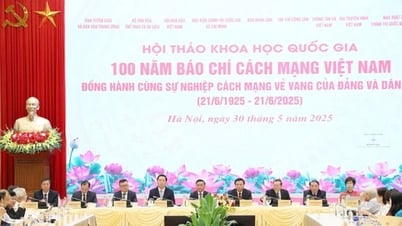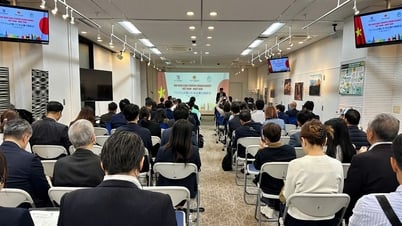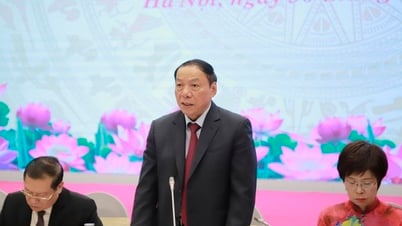
Vietnam in the group the US prioritizes in trade negotiations
Mr. Do Ngoc Hung - Commercial Counselor in the United States informed that in the first quarter of 2025, Vietnam's exports to the United States reached 31.4 billion USD, an increase of 22% over the same period in 2024, while imports reached 4.1 billion USD, an increase of 21%, this shows the complementary foreign trade structure between the two countries.
However, if high tariffs are applied, Vietnam’s electronics industry will be significantly affected, with production costs increasing and competitiveness in the US market decreasing. The textile and footwear industries, which employ a lot of labor, will also face many challenges due to declining demand and orders.
Regarding efforts to negotiate a trade agreement between Vietnam and the United States, Mr. Hung said that Vietnam is among the countries that the United States prioritizes for negotiation, along with India, the United Kingdom, Japan, South Korea, and Indonesia.
Many large US businesses support and believe that Vietnam will reach an agreement with the US, through the removal of reciprocal tariffs.
Ms. Tran Thu Quynh - Trade Counselor in Canada said that the trade tension between Canada and China, along with Canadian businesses looking for new partners, has created opportunities for Vietnamese goods. The shift of Canadian consumption away from US goods has also reshaped Canada's supply chain, creating opportunities for countries with free trade agreements with Canada, including Vietnam.
Regarding the possibility of exporting Vietnamese goods to the Australian market, Ms. Nguyen Thu Huong, representative of the Vietnam Trade Office in Australia, informed that Vietnam's exports to Australia increased by 13.2% in the first 3 months of 2025, reaching nearly 1.6 billion USD, with many Vietnamese export industries growing well.
Exporting to Australia has many advantages due to the good bilateral relationship. Preferential tariff policies from free trade agreements that Vietnam and Australia are both members of, such as CPTPP, AANZ, RCEP. In particular, the Vietnamese and Asian communities in Australia are very large.
However, due to the global trade war, market purchasing power has decreased, prices have increased, and the Australian dollar has lost the most value in the past 5 years.
“Vietnamese goods will certainly face great competition from goods from China, Thailand and many other countries. Not to mention, if Australia reduces tariffs on US goods, Vietnamese agricultural products will have to compete with US agricultural products,” Ms. Huong said.
Representatives of Vietnamese trade offices abroad also said that the US tariff policy has caused fluctuations in the world market, but challenges always come with opportunities. Therefore, businesses need to improve production capacity to be able to export sustainably to existing markets while increasing access to new markets.
Trade agencies will grasp market information, consumer trends and new policies of the host country to provide to businesses, support businesses to meet new standards and penetrate global markets and potential markets.

Timely market information, negotiation progress
Referring to the current situation and difficulties of enterprises, Mr. Truong Van Cam - Vice President and General Secretary of the Vietnam Textile and Apparel Association said that textile and garment is one of the industries greatly affected by the reciprocal tax policy of the United States.
If a reasonable tax rate cannot be negotiated, businesses will face many difficulties, reduce production, and seriously affect the jobs of more than 3.4 million workers.
Proposing solutions, Mr. Cam suggested that the trade office regularly inform about the market situation, the latest trends of US consumers, and the progress of tax policy negotiations.
“Currently, businesses are working hard to complete orders within the 90 days of the US tax deferral, but businesses really need the latest information to assess the market situation to decide whether to continue signing orders or not,” Mr. Cam said.
In addition, for other markets, the textile industry also needs specific information about the ability to boost exports, especially Russia, Brazil, Chile, the Middle East, etc.
Also a major export industry, Mr. Nguyen Hoai Nam - General Secretary of the Vietnam Association of Seafood Exporters and Producers said that Vietnam is in the top 10 largest seafood exporting countries to the United States. During the 90-day US tax deferral, businesses are racing to produce.
Despite his confidence in the response measures taken by the authorities, Mr. Nam said that businesses face many concerns. The US-China trade tensions could cause China to have a surplus of exported seafood, forcing it to sell domestically, reducing demand for Vietnamese seafood, which would have a strong impact on Vietnam's seafood exports to this market.
He hopes that functional agencies and Vietnamese trade offices abroad will support the industry in opening up potential markets so that businesses can expand their markets.
The representative of the Vietnam Electronic Business Association recommended that the Ministry of Industry and Trade organize in-depth trade promotion conferences in potential markets such as India, Russia, etc.; regularly provide early warnings about trade policies and tariffs of the host country. In addition, provide information on electronic product lines with high demand, notes for exporting electronic products, and categories that can be accessed by electronics businesses, etc.
Source: https://hanoimoi.vn/doanh-nghiep-xuat-khau-muon-ho-tro-tim-thi-truong-moi-700677.html



![[Photo] Journalists moved to tears at the Memorial Service for the soldiers who died in Gac Ma](https://vphoto.vietnam.vn/thumb/1200x675/vietnam/resource/IMAGE/2025/5/30/9454613a55c54c16bf8c0efa51883456)

![[Photo] A delegation of 100 journalists from the Vietnam Journalists Association visits the soldiers and people of Truong Sa island district.](https://vphoto.vietnam.vn/thumb/1200x675/vietnam/resource/IMAGE/2025/5/30/0984a986227d4e988177f560d2e1563e)
![[Photo] National Conference "100 years of Vietnamese Revolutionary Press accompanying the glorious cause of the Party and the nation"](https://vphoto.vietnam.vn/thumb/1200x675/vietnam/resource/IMAGE/2025/5/30/1cf6cd5c8a934ebfa347028dcb08358c)
![[Photo] General Secretary To Lam receives Chief of the Central Office of the Lao People's Revolutionary Party](https://vphoto.vietnam.vn/thumb/1200x675/vietnam/resource/IMAGE/2025/5/30/140435f4b39d4599a3d17975dfb444c5)

















































































Comment (0)